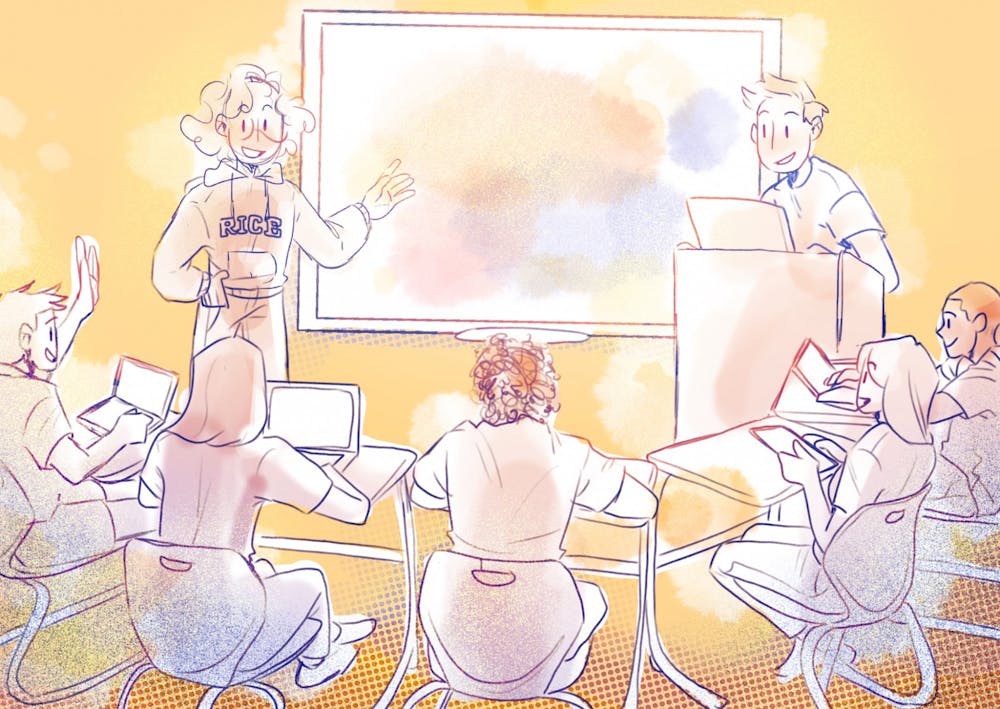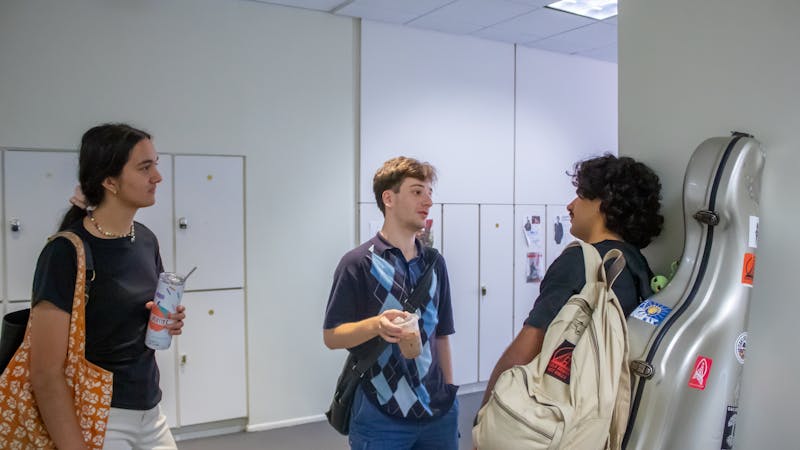Science, tech, engineering and crochet: looking at COLL courses

Hai-Van Hoang / Thresher
Like any other course, COLL 113 begins with a discussion of the assigned readings. The current discussion topic is the relationship between crocheting and coding, and how the fields can be used to inform one another. Afterwards, the teacher demonstrates crochet techniques for the class, projected on a screen so her hands are visible.
COLL 113, however, is not your typical course: the teacher, Evelyn Chiu, is younger than many of her students. The course is one of Rice’s special ‘college courses,’ one-credit hour student-taught courses which allow students to teach their passions to anyone interested. The subjects of college courses range from AI-based chess to space medicine to politics in pop music.
Chiu’s course, STEM-Inspired Crochet 101, is a continuation of a previous course. Chiu personally added the STEM aspect to the course, but said she wants to ensure that students are able to have the crocheting experience they expect.
“A lot of these seniors had already known of this crochet course,” Chiu, a Sid Richardson College sophomore, said. “Trying to be able for them to learn crochet the way they wanted to and also introducing my new angle was hard.”
Amanda M. Jungels is the associate director of the Center for Teaching Excellence, which is responsible for overseeing and approving student-taught courses. She said she was impressed by the breadth of topics covered by such courses.
“A lot of creative intellectual work goes into planning the courses,” Jungels said. “I think it’s really rewarding for the students who take them as well as the students who teach them.”
COLL courses were introduced in 2006 as an opportunity for students to share their knowledge of a specific topic. Initially, they were overseen by the dean’s office, but in 2020 the responsibility for college course oversight shifted to the CTE, Jungels said.
According to the CTE website, in order to teach a college course, students must take COLL 300, a six week pedagogy class in which they learn how to design a course and write a syllabus. After that, the course can be submitted to college magisters, who perform the first round of vetting, and later to the CTE for final approval.
In addition to letting students to share their passions, college courses provide some benefits over traditional courses. According to Will Rice College senior Nikhaz Omar, who co-teaches A Linguistic Take on ConLangs, a course on constructed languages, student-taught courses can alleviate the pressures of a traditional classroom environment.
“Being taught by your peers and teaching your peers gets rid of a lot of the hierarchical structure,” Omar said. “It’s an easier environment to learn in.”
Jungels also points out that student-run courses can fill gaps in the traditional Rice curriculum, where students can offer unique perspectives on niche topics that may not be offered by departments.
“They approach it from a very different perspective than your average tenured faculty might,” Jungels said.“Rice doesn’t offer Hindi or Urdu classes, so this is an opportunity for them to get a brief introduction to it,”
Although the deadline for introducing a new COLL course is Feb. 24, Omar recommends that in the future, more students take advantage of the opportunity to teach college courses.
“It’s amazing that Rice does this, and it’s kind of disappointing that more students aren’t taking advantage of this,” Omar said. “There’s definitely a demand for people to take the classes, we just need more people to teach them.”
Sandra Parsons, the associate professor responsible for teaching COLL 300 this semester, says that teaching a COLL course builds critical skills, even for those not interested in teaching as a career.
“It’s a really great skill-building exercise,” Parsons said. “Being able to teach something to other people is invaluable. That’s something that you will use in absolutely any context that I can think of.”
More from The Rice Thresher

Over 1,000 students petition against new meal plan
When Konstantin Savvon opened the Housing and Dining email announcing the new unlimited meal plan, he was instantly concerned about the impact on off-campus students like himself.

Rice shuttle bus drivers reflect on changes and connections behind the wheel
Martine Stewart has spent the past year behind the wheel of Rice’s greater loop shuttle, circling the inner campus from the early morning to late afternoon. She said she has come to recognize many of her regular riders – not just their faces, but the exact spots where they wait to be picked up.

Music majors at Rice’s Shepherd School tackle busy schedules, future goals
Cirdan Vonnahme began playing the cello at 4 years old. After winning his first competition at 11 and debuting with an orchestra, he realized he wouldn’t mind playing the cello for life.

Please note All comments are eligible for publication by The Rice Thresher.